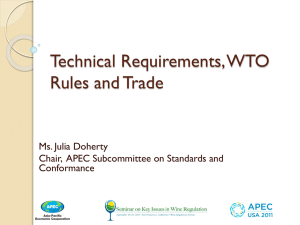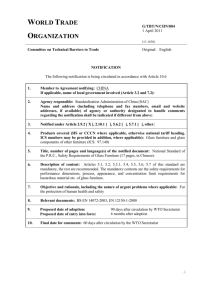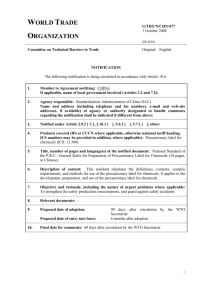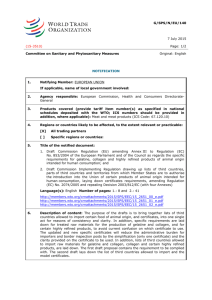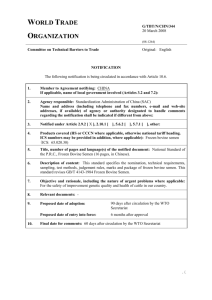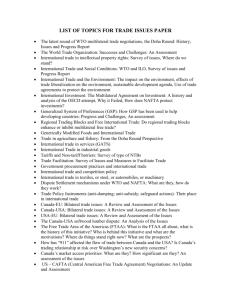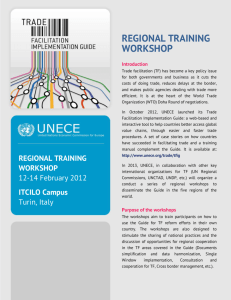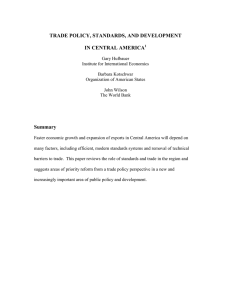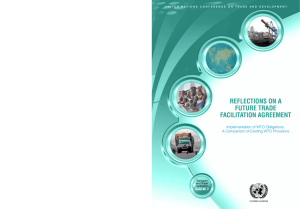WTO Legal Aspects of UNECE Report "Regulatory and Procedural
advertisement
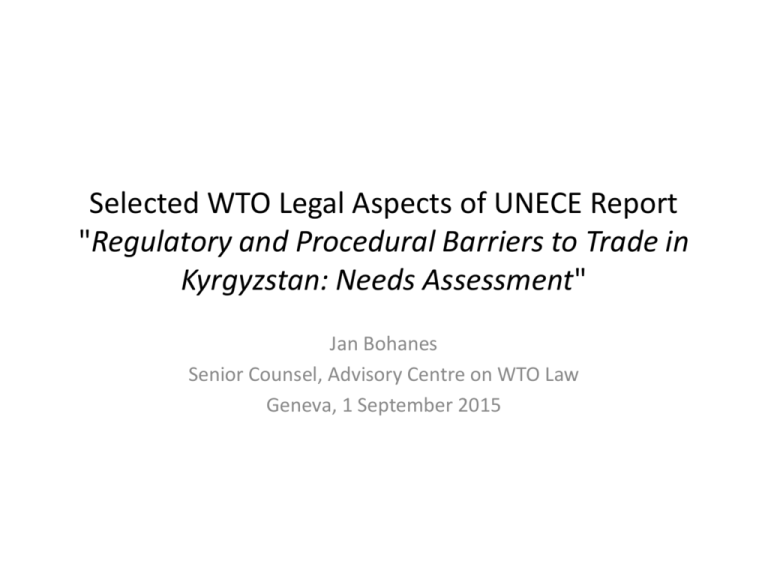
Selected WTO Legal Aspects of UNECE Report "Regulatory and Procedural Barriers to Trade in Kyrgyzstan: Needs Assessment" Jan Bohanes Senior Counsel, Advisory Centre on WTO Law Geneva, 1 September 2015 Overview of selected topics • Regulatory and Standardization Policies: Technical Regulations, Standards and Quality Assessment & Sanitary and Phytosanitary Measures • Aspects relating to Regional Integration • Trade Facilitation Aspects Regulatory and standardization policies (1) • Issues highlighted/recommendations by UNECE Report – Use of technical regulations and technical standards: quality control and quality assurance system; capacity shortfalls; need to strengthen (standard setting) expertise; equivalency arrangements; (comprehensive) mutual recognition agreements. • Relevant WTO disciplines • No unnecessary technical barriers to trade (Article 2.2 TBT Agreement); requirement to base SPS measures on scientific principles and risk assessments (2.2 and 5.1 SPS Agreement) • Requirement to use international standards whenever they exist, unless they are ineffective or inappropriate or a higher level of protection is desired (Article 2.4 TBT; 3.1 and 3.3 of the SPS Agreement) • The TBT disciplines apply not only to technical regulations, but also to (non-binding) technical standards enacted by standardizing bodies Regulatory and standardization policies (2) • Relevant WTO disciplines (cont'd) • Mutual recognition (Article 6.1) and MR agreements (Article 6.3) – recognize other Members' conformity assessment procedures; ensure equal treatment of requesting Members – Kyrgystan has 12 MRAs • Equivalence (Article 2.7 TBT and 4 SPS) – recognize the content of regulation of another Member as equivalent. Ensure equal treatment of requesting Members – Note: equivalence guidelines by the SPS Committee • Information dissemination (enquiry points) (Article 10.1 TBT Agreement, Annex B of the SPS Agreement) • Conformity assessment procedures Aspects relating to Regional Integration/GSP+ regime (1) • Issues highlighted by UNECE Report – Participation in the EU’s GSP+ regime – Accession to Eurasian Economic Community (EEC) Customs Union • Relevant WTO disciplines – The GSP+ regime is a preferential tariff regime covered by the Enabling Clause (although academic commentators sometimes question the WTO-legality of the EU’s criteria). Kyrgyz participation in this regime does not entail any issues of WTO-legality for Kyrgyzstan itself – Accession to EEC Customs Union will require respecting the WTO rules on re-binding (Article XXIV:6 and XXVIII), including any applicable renegotiation and compensation • Kyrgyz Republic’s trading regime vs. the CU/Russia Aspects relating to Regional Integration/GSP+ regime (2) • Relevant WTO disciplines (cont’d) – Article XXVIII negotiations are conducted with Members who have so-called "initial negotiating rights (INRs)" and "principal supplying interests"; consultations with Members who have a "substantial interest". – Examples from WTO practice concerning accession to CUs • certain Central and Eastern European countries’ accession to the EU; • Most recently, see also Armenia’s accession to the Eurasian Economic Union. – However, very little publicly available information on these negotiations themselves, because the process is confidential. Results reflected in the CU's schedule. Aspects relating to Regional Integration/GSP+ regime (3) • Relevant WTO disciplines (cont’d) – Other aspects (e.g. rise in non-tariff barriers) due to accession must be "necessary" for the accession/formation of a customs union – Discussion of intra-CU technical regulations Trade Facilitation Aspects (1) • Issues highlighted/recommendations by UNECE Report & issues to keep in mind going forward – Information dissemination; strengthen market support institutions; inform traders on changes in trade-related regulations; consolidate private sector consultation mechanisms; consolidate risk management system; improve customs valuation; – Report also highlights challenges for traders to obtain necessary import/export documents Trade Facilitation Aspects (2) • WTO disciplines – Transparency provisions in the Annex 1A agreements (GATT 1994, TBT, SPS) – New trade facilitation agreement (TFA) amplifies and specifies these obligations, e.g. publication via internet (Article 1.2.1); enquiry points (Article 1.3); advance publication (2.1) – Requirements for obtaining import and export permits/documentation must not constitute import/export restrictions and must not be discretionary (must be automatic)
